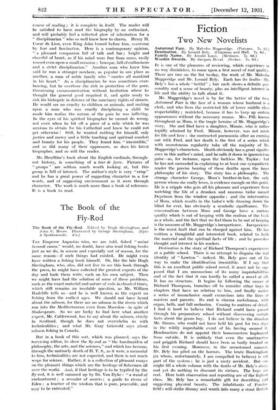THE Emperor Augustus who, we are told, fished " animi
laxandi causa," would, no doubt, have also read fishing books just as we do, in season and especially out of season, for the same reason—if such things had existed. He might even have written a fishing book himself. Or, like the late Hugh Sheringham, who, alas, did not live to see this book through the press, he might have collected the greatest experts of the day and bade them write, each on his own subject. Then we might have had the solution of some of those problems, such as the exact material and nature of rods in classical times, which still remains an insoluble question, as Mr. William Radcliffe tells us—and he is well known as the expert on fishing from the earliest ages. We should not have heard about the salmon, for there are no salmon in the rivers which run into the Mediterranean even from Macedon--in spite of Shakespeare. So we are lucky to find here what another expert, Mr. Calderwood, has to say about the salmon, chiefly in Scotland, though he does not overwhelm us with technicalities ; and what Mr. Gray Griswold says about salmon fishing in Canada.
But in a book of this sort, which was planned, says the surviving editor, to show the fly-rod as " the handmaiden of philosophy, the arts, and the sciences," and which has become, through the untimely death of H. T. S., as it were, a memorial to him, technicalities are not expected, and there is not much scope for science. Rather, it is a collection of pleasant essays on the pleasant things which are the heritage of fishermen all over the world. Arid, if that heritage is to be typified by the fly-rod, it is well summed up by Dr. Van Dyke : " a wand of enchantment ; a revealer of secrets ; a guide to rivers of Eden ; a teacher of the wisdom that is pure, peaceable, and easy to be entreated."










































 Previous page
Previous page